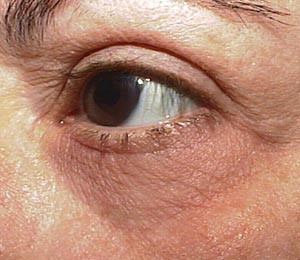Laser Resurfacing
General Description Laser Skin Resurfacing of the Eyelids and Face
- Aging of the skin is one of the most obvious and cosmetically apparent changes that happens as we grow older. The process of skin ageing is accelerated by excessive exposure to sunlight, hereditary and lifestyle factors such as nutrition, alcohol consumption and smoking. These, along with other conditions like pregnancy and birth control pills lead to in wrinkles or pigmentary lesions of the skin such as scars, blotches, brown spots or even precancerous skin lesions. Ageing of skin might possibly be aptly dealt with Laser Skin Resurfacing, which is a very safe and effective technique to improve your skin by reducing the amount and severity of facial and eyelid wrinkles, while also correcting minor skin flaws with precision and surety.

- Laser Skin Resurfacing is considered one of the finest developments in skin health and rejuvenation techniques. It has found numerous takers because of its safety, low risk profile, consistency, shorter recovery period and exceptional cosmetic results. It has been effectively used in treating wrinkles, blotchiness or age spots, and scars from pimples or precancerous lesions of the skin.
- Laser Skin Resurfacing involves injuring layers of your skin using laser beams in such a way that subsequent healing of the microscopic burns produces scarring within underlying collagen tissues, thereby resulting in skin tightening, changes in skin colour and texture. It is usually done under anaesthesia.
Who are the best candidates for Laser Skin Resurfacing?
- Laser Skin Resurfacing is not for everyone! Some of the best candidates for Laser Skin Resurfacing of the eyelids or face include those with:
- Facial skin wrinkled due to age or other cause
- Liver spots or age spots (solar lentigines)
- Facial skin damaged by excessive exposure to sunlight
- Awkwardly placed wrinkles around the mouth
- "Crow's feet" lines around the eyes
- Fine lines around the mouth or forehead
- Laxity of skin around lower eyelids
- Fine wrinkles around upper eyelids
- Blemishes, brown spots or blotchiness of skin
- Shallow pimple or chicken pox scars
- Injury-induced superficial scars
- Some precancerous skin lesions
Laser Skin Resurfacing is best avoided for treatment of stretch marks or if you are prone to acne, suffering from acne, or have a very dark skin.
Difference between Types of Lasers, Results and Ideal Patients
- Laser Skin Resurfacing is usually done with a 2940 nm Er:YAG laser or a 10,600 nm CO2 laser, which vaporize skin cells causing it to heal by controlled scar formation.
CO2 Laser Resurfacing Laser Skin Resurfacing of the Eyelids and Face
- The originally complete laser resurfacing was done using CO2 laser in the 1990’s. Since then, it has been used to manage various skin conditions, such as wrinkles, scars, warts, enlarged sebaceous glands of the face and nose, lentigo simplex, seborrheic keratitis, small syringomas, epidermal melisma and dermatochalasis.
- Fractional resurfacing using CO2 laser is the latest incarnation of this popular laser treatment technique and uses ultra-short laser beams in a scanning pattern that helps skin remodelling with very little damage. It has a short recovery period and shows excellent results within two to three weeks.
Er:YAG Laser Resurfacing Laser Skin Resurfacing of the Eyelids and Face
- Erbium laser resurfacing helps in removing surface-level and moderately deep lines and wrinkles on the face, hands, neck, or chest. It is also associated with minimal burning of surrounding tissues. With fewer side effects and a quicker recovery period, it is preferred for those seeking faster results for superficial lesions. It can also be used for darker-skinned individuals.
Skin Anatomy
- The skin offers protection to all the body organs making it prone to damage from the sun, dirt, chemicals in the atmosphere and strong wind.
- Overtime, the skin changes and there is a reduction of collagen which then leads to formation of deep lines and wrinkles moderately around the eyes and mouth.
- Laser resurfacing treatment takes advantage of the ability of the {human} skin to rejuvenate and grow new skin.
.jpg)
Laser resurfacing procedure
- Preparation for the procedure is essential for best results. Prior to laser resurfacing procedure, the doctor advises on medication and supplement which should not be taken which might possibly affect blood clotting at least for about 10 days before the procedure. Medication such as ibuprofen, Aspirin and vitamin E are among those to be avoided.
- The doctor might possibly prescribe change of lifestyle such as to quit smoking prior to laser resurfacing procedure to facilitate quick healing. To prevent bacterial infection antibiotics are prescribed to create conducive environment for the procedure.
- Laser resurfacing involves directing of short pulsating beams of light on the skin with damages. The top layer of the skin pees off leaving the lower pink surface. The treated area is bandaged and cleaned 4-5 times a day. The doctor might possibly give anesthesia or sedate you to ease the discomfort. A full face treatment might possibly be given or specific areas affected by fine lines which includes the area around the eyes and mouth and the forehead. There are two common technologies of laser resurfacing;


.jpg)
